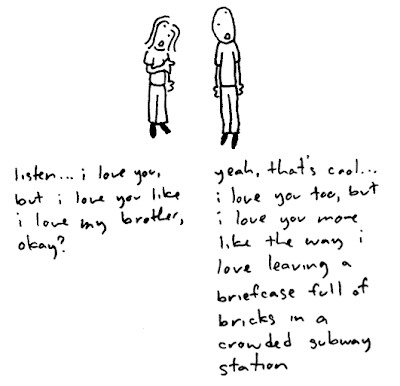love, analytically |

reason and love keep little company together now-a-days; the more the pity that some honest neighbours will not make them friends.-- A Midsummer Night's Dream
Shut it, 'Love Actually'!-- Jamie McDonald
2022 Note: I wrote this in recovering from the most painful moment of my life.
We are obsessed with love as much as our lovers. But there’s a difference between bare usage and actual thought about it.
If anything at all does not qualify for cold, crackly analytic attention, then the unspeakable analysandum, love, is it. Because 1) it’s holistic if it is anything; because 2) it seems small from outside; because 3) it is, fundamentally, uncomfortable to read about. (But nothing doesn’t qualify.)
As a culture we haven’t moved on from (or even reached the level of) the four Greek words, and we seem to be torturing ourselves over a vague mire borne of half-successful feminism and runaway adolescent bullshit. Speaking of which:
1. Eros; soul mates; symbiotic clutch
- "You are my life now."
- "It makes me… anxious… to be away from you."
- "I’m here, and I love you. I have always loved you, and I will always love you. I was thinking of you, seeing your face in my mind, every second that I was away. When I told you that I didn’t want you, it was the very blackest kind of blasphemy."
- "I just want it to be official — that you belong to me and no one else." (on marriage)
- "Bring on the shackles — I’m your prisoner."
Amour fou is what passes for love in most art. “true love”. Passion and possession.
Augustine describes it as “eating one another up, as people do with their food.” Consuming, being consumed; love to ignite you and burn you out. the desire to make another into ourselves. Nietzsche calls it natural love. This isn’t a compliment.
One of the few people I’ve ever managed to speak about this with had a terrifying ideal: love as mind-meld, as unified entity. filed under “emo” and thus disarmed and made ridiculous rather than scary.

2. Aphorisms (what most people seem to think philosophy is)
“To love is to be delighted by the happiness of another.”
- Leibniz
“he was the only person who could really interest her in herself.”
- Sartre
love, the occupation of the idle
- Diogenes
“It is an act of endless forgiveness, a tender look which becomes a habit.”
- Peter Ustinov
“the only sane and satisfactory answer to the problem of human existence.”
- Erich Fromm
“Love feels like a great misfortune, a monstrous parasite, a permanent state of emergency that ruins all small pleasures.”
- Slavoj Žižek
“Entering it, one is suddenly aesthetically magnified; the stars are presenting for you alone, birdsong is omnipresent and omnibenevolent. An astounding amount of negative experience becomes perfectly tolerable, and the merest things about the object become cosmically significant.”
“There is a limit to what one may do if one is the object or cause of jealousy; for the jealous lover, everything one does is transmuted into misdirected love. It is a vicious and total transformation of the world, the inverse of the other love’s action. And you cannot understand what you hate”
3. critique
After the modern, hollowness. Sex is about power. Porn is not about women, nor really even sex; porn is about use and ease of escape. Love, they said finally, is a patriarchal construction.
How can one reply? (Incredulity just makes you a victim of the ideology.)
From Nietzsche on through the postmodernists he accidentally gave breath to, we find critique of the great dumb thing.
Firstly, love is not a universal emotion; many cultures apparently lack it. Even leaving aside the large and intimidating Marxist (and on through “French feminism”) readings, love can be called a twinned egoism, stupid contentment, a smug sharing in the fact of one another rather than a proper communal cause.
“Love, which was once believed to contain the Answer, we now know to be nothing more than an inherited behavior pattern.” – James Thurber
Concretely we could talk about how much of love has the built-in premise: “P: life revolves around my love.” I can see why you’d want to resist this, as slavish surrender, but it’s also just true for most people. Maybe amend it to “loves”, i.e. favourite things, obsessions, and then I’d have to endorse it despite its problems.
Nietzsche went on about how love is actually an expression of the “deadly hatred of the sexes”; men and women fundamentally hate each other, and their relationships are the “war in its means”. This horrible idea is given development in Germaine Greer et al, when they talk about the artificiality of relationships and the extraordinary social structures that had to develop in order to get the genders to coexist.
Others agree that it’s all an evolutionary and socially oppressive structure - an act of sublimated violence, and a base urge for control, possession and a steady supply of fucking. (Genetic fallacy…)</div><div align="left"></div><div align="left"></div><div align="left"></div><div align="left"> With all due respect to the social sciences and the Marxist feminists, and despite the uncontested correctness of some of the above, excuse me while I hold on to my intuitions for once, and get my coat. </div>
4. “Volo ut sis” (I want you to be)
“volo ut sis”, misattributed to St Augustine : supposed to be his name for ideal love. caritas, agape; God’s love.
Hannah Arendt used it for the basis of a politics; Volo ut sis is a relation with someone that doesn’t restrict the other. Superlative respect, trust and encouraging warmth, with each ego trying not to impose itself on the other…
You do this by “sharing another’s object” - that is, take on their reading of the world, and avoid dictating yours. It could be decried as pragmatic love, as head-love - merely philia? - since it sounds somewhat voluntary and cognitive. But I don’t see such an objection coming from many folk who’ve actually ever had a lasting relationship.
“Love does not cause suffering: what causes it is the sense of ownership, which is love’s opposite” – Antoine de Saint-Exupéry
is anyone actually capable of such a thing?
THE LOGICAL TREATMENT OF THE PATIENT
“Philosophy stands in the same relation to the study of the actual world as masturbation to sexual love.”
– Marx, in “The German Ideology”
we do this to reality as a whole, to Time, to modal multiverses: what disqualifies a mere emotion from it? To make philosophy a thing apart, as Marx does in the above quote, is simplistic; there’s surely nothing wrong with the age-old moot: “What in the fuck is this thing?”</div><div align="left">
The opposing of reason and emotion in the Western tradition is extremely overwrought, but even so …to deduce a logical warrant of desire… </div><div align="left"></div>
- Does love exist?
- What is its nature?
- How does one know it?
- How does one know how one knows it? etc.
- Which distinct categories are identifiable?
- What are the truth-conditions for its obtaining?
- etc.
Discourse: Love treated as an attitudinal belief (like fear). "Lovable" posited as an attributed property of the objects of love. Misattribution and epistemic factors raised.
"There is a class of emotions the members of which share the following characteristics:
1) If a person x feels one of these emotions then it will always be possible for him to specify what it is 'about'.
2) If x feels the emotion E, and y is the object, then x believes y to have a specific set of properties.
∃Φ(xy)(Exy ⇒ BxΦy)
Φ cannot, of course, tell us much about the object y or how y appears to x. It is instead a determinable quality, which all objects which elicit E can be said to possess.
3) x will therefore also believe that y has certain determinate qualities ψ and that it is due to these that y has the determinable Φ.
(xy)(∃ψ)(Exy ⇒ Bxψy)
4) Features 1-3 are necessary (but insufficient) conditions for feeling an emotion of this class."
Given these features we have a basis on which to decide whether experiencing some emotion on this or that occasion is justified or no. There is a lack of symmetry in such reasoning with emotion: while it is sufficient for an emotional reaction to be unjustified if the beliefs involved are irrational, the rationality of such beliefs is not enough for their justification...
The question I want to discuss here is whether love belongs to the class of emotions characterized by the conditions set out above and can be considered justifiable..."
God, it's compelling. Like a car crash.
I've ranted before that "Why do you love them?" is an empty question, simply answerless, since to do a When Harry Met Sally rundown is to formalise, and formalisations are never semantically cheap. No amount of language can ever really represent such complex phenomena. Further:
"Love is not a feeling. Love is put to the test, pain not. One never says: ‘That was not true pain, or it would not have gone off so quickly’."
- Wittgenstein
Comments
Tags: becoming